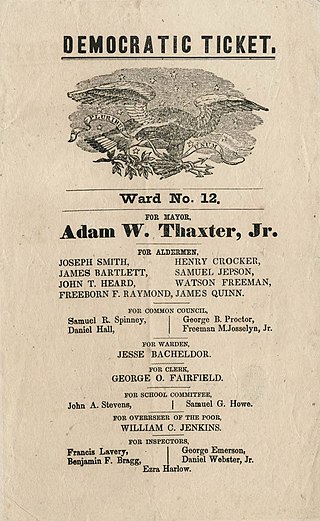Election
| ||||||||||||||||
| ||||||||||||||||
| ||||||||||||||||
The 1864 Boston mayoral election was held on December 12, 1864 [1] and saw Frederic W. Lincoln Jr. reelected to a sixth overall term.
| ||||||||||||||||
| ||||||||||||||||
| ||||||||||||||||
| Elections in Massachusetts |
|---|
 |
The 1864 Boston mayoral election was held on December 12, 1864 [1] and saw Frederic W. Lincoln Jr. reelected to a sixth overall term.
Mayor Frederic W. Lincoln Jr. was renominated by the Republican Party, which ran under the "Union Republican" banner amid the ongoing American Civil War. [2] Lincoln's opponent, Thomas Coffin Amory, accepted the nomination of the Democratic Party in a letter that was read on his behalf to the December 2, 1864 meeting of the city's Democratic Ward and City Committee. [3]
The Boston Evening Transcript characterized Mayor Lincoln as a strong front-runner, writing on December 3, 1864, "there can be no doubt ever of the triumphant re-election of Mayor Lincoln and his associates on the Union Republican ticket." [4] After the election, the Boston Evening Transcript wrote that the election of Lincoln and the Union Republican nominees for other municipal offices had been a "foregone conclusion". [2]
The Boston Evening Transcript described the margins of the victory received Lincoln and his fellow Union Republican nominees for city offices were, "extraordinarily large". It also characterized the turnout for the election as, "small" when compared to that of the 1864 United States presidential election that was held in November. [2]
| Party | Candidate | Votes | % | |
|---|---|---|---|---|
| Republican | Frederic W. Lincoln Jr. (incumbent) | 6,877 | 71.41 | |
| Democratic | Thomas Coffin Amory | 2,732 | 28.37 | |
| Others | Scattering | 21 | 0.22 | |
| Turnout | 9,630 | |||
Thomas Coffin Amory Jr. was born in Boston, Massachusetts, the youngest son of Jonathan Amory and his wife Mehitable (Sullivan) Culter. An American lawyer, historian, politician, biographer, and poet, he graduated from Harvard University in 1830. He became a member of the bar of Suffolk County, Boston in 1834. He served in the legislature of Massachusetts and in the municipal government of Boston.
The Boston mayoral election of 1907 was held on Tuesday, December 10, and saw Republican nominee George A. Hibbard defeat Democratic incumbent John F. Fitzgerald as well as Independence League nominee John A. Coulthurst. Ahead of the general election, primary elections for each party had taken place on Thursday, November 14, 1907.
The Boston mayoral election of 1857 saw the election of Frederic W. Lincoln Jr. It was held on December 14, 1857.
The Boston mayoral election of 1858 saw the reelection of Frederic W. Lincoln Jr. It was held on December 13, 1858.
The Boston mayoral election of 1859 saw the reelection of Frederic W. Lincoln Jr. to a third consecutive term. It was held on December 12, 1859.
The Boston mayoral election of 1860 saw the election of Democratic Party nominee Joseph Wightman. This was the first Boston mayoral election won by a Democratic Party nominee. It was held on December 10, 1860.
The Boston mayoral election of 1861 took place on Monday, December 9, 1861, and saw the reelection of Joseph Wightman.
The 1868 Boston mayoral election was held on December 8, 1868 and saw Frederic W. Lincoln Jr. be returned to the mayoralty for a fourth non-consecutive term, unseating incumbent mayor Joseph Wightman.
The 1863 Boston mayoral election was held on December 14, 1863 and saw Frederic W. Lincoln Jr. reelected to a fifth overall term.
The Boston mayoral election of 1869 saw the reelection of Nathaniel B. Shurtleff to a third consecutive term.

Beginning shortly after the city's incorporation as a city in 1846, elections have been held in the mayor of Manchester, New Hampshire. The following article provides information on the elections for mayor in the city during the 20th century.

The 1851 Boston mayoral election saw the election of Benjamin Seaver, a former president of the Boston Common Council, as mayor of Boston. The election took three votes, as no candidate secured the needed majority in the first two attempts. In the third attempt, Seaver won the required majority by the margin of a single vote. Incumbent Whig mayor John P. Bigelow was not a nominee for reelection.
The 1848 Boston mayoral election saw the election of Whig Party nominee John P. Bigelow. It was held on December 11, 1848. Incumbent Whig mayor Josiah Quincy Jr. was not a nominee for reelection.
The 1847 Boston mayoral election saw the reelection of Whig Party incumbent Josiah Quincy Jr. to a third consecutive term. It was held on December 13, 1847.
The 1846 Boston mayoral election saw the reelection of Whig Party incumbent Josiah Quincy Jr. It was held on December 14, 1846.
The December 1845 Boston mayoral election saw the election of Whig Party nominee Josiah Quincy Jr. It was held on December 8, 1845.
The 1844–45 Boston mayoral election saw the election of Native American Party nominee Thomas Aspinwall Davis as mayor of Boston. The election took eight votes, as no candidate secured the needed majority in the first seven attempts. Incumbent Whig Party mayor Martin Brimmer was not a nominee reelection.
The 1843 Boston mayoral election saw the reelection of Whig Party incumbent Martin Brimmer. It was held on December 11, 1843.
The 1842 Boston mayoral election saw the election of Whig Party nominee Martin Brimmer. It was held on December 12, 1842. Whig Party incumbent Jonathan Chapman was not a nominee for reelection.
The 1841 Boston mayoral election saw the reelection of Whig Party incumbent Jonathan Chapman to a third consecutive term. It was held on December 13, 1841.